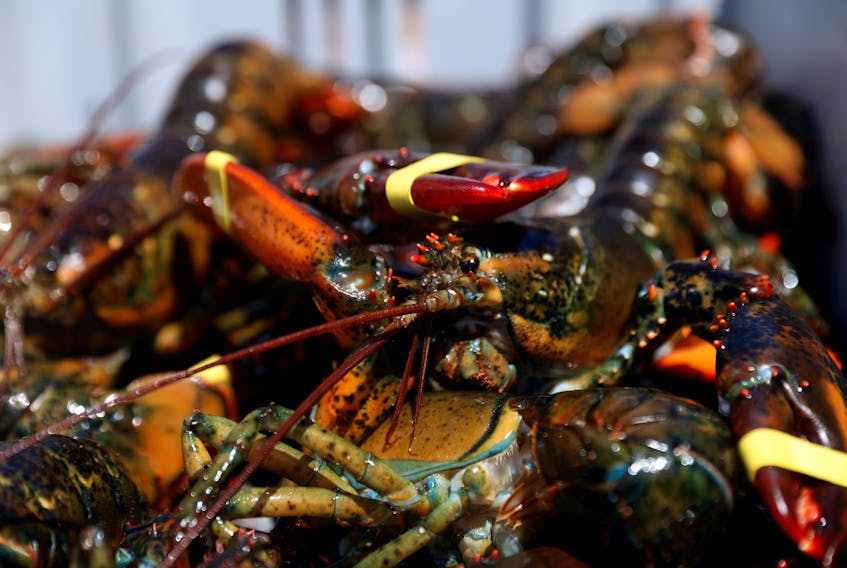MARLEY KINGSTON
With the Maritime bubble opening, I was recently able to go home and spend time with my family in the Miramichi. This quality time included what was, by my desk-job standards, an unusually early morning to mark the end of the spring lobster season. My dad and uncles wanted to be “on deck” bright and early to help my cousin haul his lobster traps home. Even my mother had the pot on and boiling before 7 a.m.
You could see this end-of-season activity on any wharf, and later the traps laying out — or stacked — in any yard home to lobster fishers out of the Gulf of St. Lawrence, where they were making the best of the 2020 season extension. The extra four days was helpful for some; however, the future for many harvesters is still unclear. Some fishing areas have done okay this year in the Maritimes, but the course ahead for many remains very foggy indeed.
As the policy analyst for CFIB in P.E.I., in early May I worked with my colleagues to write a letter to the Minister of Fisheries and Oceans and Member of Parliament for Nova Scotia’s South Shore, Bernadette Jordan. This letter pleaded for help for fish harvesters, the folks who risk their lives on the water harvesting one of Atlantic Canada’s most important resources and exports, lobster.
Lobster harvesters were deeply concerned about a quickly evaporating market and a glut of product driving down the price of their livelihood. With good reason. It wasn’t unusual for folks finding $4.50 and $5 per pound lobster being sold across the province.
Given the economics of lobster fishing, $5 per pound is generally seen as the low-water mark to break even for lobster. Below that, it is difficult to rationalize putting a boat in the water to dump traps. While this was going on, the federal government was rolling out its array of programs to subsidize business: the Canada Emergency Business Account (CEBA) , the Canada Emergency Response Benefit (CERB), the Canada Emergency Wage Subsidy (CEWS) and the Canada Emergency Commercial Rent Agreement (CECRA).
Government also announced a special program for seafood processors; however, none of these programs fit the harvester business model and most sat outside the eligibility requirements. We wrote the letter to Minister Jordan who, as a Nova Scotian, should understand not only the difficulties of the industry but also the dire need for assistance; the economic shutdown was hammering markets and uncertainty swirled around the impact of COVID-19 on the industry.
Government responded on May 14 with Prime Minister Trudeau announcing the Fish Harvester Benefit, a program worth up to $267.6 million, to help provide income support for this year’s fishing seasons to eligible self-employed fish harvesters unable to access the Canada Emergency Wage Subsidy. This would amount to $847 per week for up to 12 weeks.
They also announced the Fish Harvester Grant, a program worth up to $201.8 million, to provide grants to help fish harvesters ineligible for the CEBA. This program allows for non-repayable grants of up to $10,000 to self-employed fish harvesters with a valid fishing licence, the size of the non-repayable support to vary depending on the level of fish harvesters’ historic revenue. They also proposed changes to Employment Insurance (EI) to allow fish harvesters to access EI benefits on the basis of insurable earnings from previous seasons.
Since then, fishing seasons have come and gone, and further details on the programs, including those surrounding eligibility, remain scarce. Outreach to government has only provided a response of “we’re working on it.” In mid-June, CFIB sent another letter directly to the minister asking for an update on the programs, and clarification on both eligibility details and the language used when the programs were announced. We have yet to get a response.
We understand developing these programs in our current unusual circumstances takes work, but it is incumbent on the minister to keep those who are relying on some degree of certainty about their future informed on the progress of the promised $470 million programs. Like many other small independent businesses, fishing is a family business, and with the fall seasons fast approaching, fish harvesters will need to assess their options to keep their business afloat.
Marley Kingston is a policy analyst for the Canadian Federation of Independent Business (CFIB) based in Charlottetown.









